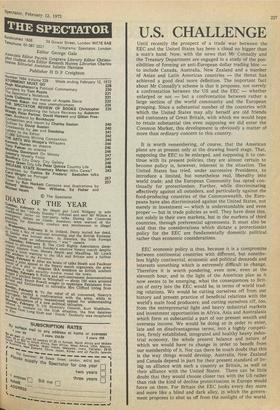U.S. CHALLENGE
Until recently the prospect of a trade war between the EEC and the United States has been a cloud no bigger than a man's hand. Now, with the news that Mr Connally and the Treasury Department are engaged in a study of the possibilities of forming an anti-European dollar trading bloc — to include Canada, Australia, New Zealand and a number of Asian and Latin American countries — the threat has achieved a good deal more definition. The important fact about Mr Connally's scheme is that it proposes, not merely a confrontation between the US and the EEC — whether enlarged or not — but a confrontation between rather a large section of the world community and the European grouping. Since a substantial number of the countries with which the United States may ally herself are old friends and customers of Great Britain, with which we would hope to retain substantial ties even supposing we did enter the Common Market, this development is obviously a matter of more than ordinary concern to this country.
It is worth remembering, of course, that the American plans are at present only at the drawing board stage. That, supposing the EEC to be enlarged, and supposing it to continue with its present policies, they are almost certain to become policy is, however, inherent in the situation. The United States has tried, under successive Presidents, to introduce a limited, but nonetheless real, liberality into world trade; and the European Community has opted continually for protectionism. Further, while discriminating effectively against all outsiders, and particularly against the food-producing countries of the Commonwealth, the Europeans have also discriminated against the United States, not merely in investment — which is understandable and even proper — but in trade policies as well. They have done this, not solely in their own markets, but in the markets of third countries, through preferential agreements. It must also be said that the considerations which dictate a protectionist policy for the EEC are fundamentally domestic political rather than economic considerations.
EEC economic policy is thus, because it is a compromise between continental countries with different, but nonetheless highly continental, economic and political demands and interests something which is extremely difficult to change. Therefore it is worth pondering, even now, even at the eleventh hour, and in the light of the American plan as it now seems to be emerging, what the consequences to Britain of entry into the EEC would be, in terms of world trading relations. We would be cutting ourselves off from our history and present practice of beneficial relations with the world's main food producers; and cutting ourselves off, too, from the entreprenurial light and heavy industrial markets and investment opportunities in Africa, Asia and Australasia which form so substantial a part of our present wealth and overseas income. We would be doing so in order to enter, late and on disadvantageous terms, into a highly competitive, firmly established, integrated and healthy heavy industrial economy, the whole present balance and nature of which we would have to change in order to benefit from our membership of it. Nor can there be much doubt that this is the way things would develop. Australia, New Zealand and Canada depend in part for their present standard of living on alliance with such a country as Britain, as well on their alliance with the United States. There can be little doubt that they would choose closer ties with the US rather than risk the kind of decline protectionism in Europe would force on them. For Britain the EEC looks every day more and more like a blind and dark alley, in which the government proposes to shut us off from the sunlight of the world.










































 Previous page
Previous page